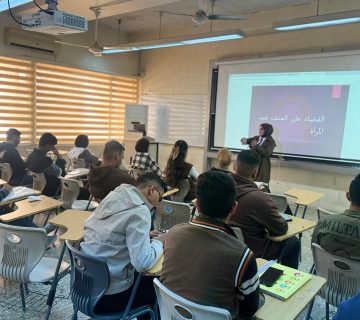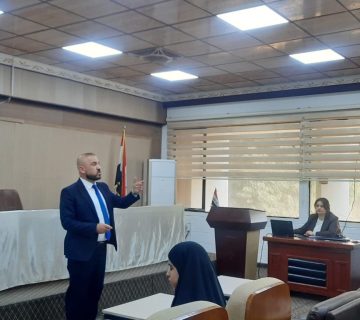Asst. Prof. Dr. Ilham Ali Bayawi, Director of the Women’s Affairs Unit at the College of Engineering – University of Baghdad, participated on Monday, November 24, 2025, in a scientific seminar titled “The Rights of Working Women in the Current Iraqi Labor Law and the Proposed Amendments to Strengthen Them.” The seminar was organized by the Women’s Affairs Unit at the College of Law in cooperation with the Women’s Affairs Unit at the College of Engineering.
The participation came under the theme of participation and institutional reform, aiming to enhance the legal and social protection of working women and ensure a fair and safe work environment that supports their economic participation and professional empowerment.
The seminar discussed Iraqi Labor Law No. 37 of 2015 and the fundamental rights of working women, with emphasis on preventing discrimination in employment and wages and ensuring workplace safety. It also addressed proposed amendments to develop current legislation, including strengthening monitoring mechanisms, activating complaint procedures, introducing clear provisions to combat gender-based violence, expanding paid leave, and encouraging employers to provide childcare facilities within institutions.
The seminar concluded with a set of scientific recommendations, the most notable of which were: repealing the clause that excludes women from legal protection when working under the supervision of a family member; tightening penalties for violations related to the protection of women and children; expanding parental leave rights to meet actual needs; and developing a comprehensive list of hazardous occupations that apply to all working women without exception.
Through this participation, the College of Engineering – University of Baghdad reaffirms its ongoing commitment to supporting and protecting working women in the workplace and to promoting legal and social empowerment policies that contribute to developing their professional skills, thereby positively enhancing their active participation in society and the labor market.









